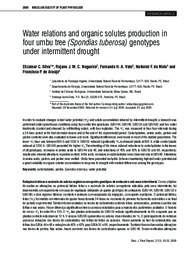Water relations and organic solutes productions in four umbu tree (Spondias tuberosa) genotypes under intermittent drought.
Water relations and organic solutes productions in four umbu tree (Spondias tuberosa) genotypes under intermittent drought.
Autoria: SILVA, E. C.; NOGUEIRA, R. J. M. C.; VALE, F. H. A.; MELO, N. F. de; ARAUJO, F. P. de
Resumo: In order to evaluate changes in leaf water potential (?w) and solute accumulation induced by intermittent drought, a research was performed under greenhouse conditions using four umbu tree genotypes (GBU 44, GBU 48, GBU 50 and GBU 68) and two water treatments (control and stressed by withholding water), with four replicates. The ?w was measured in four-hour intervals during a 24-hour period at the first stomatal closure and at the end of the experimental period. Carbohydrates, amino acids, protein and proline contents were also evaluated in leaves and roots. Significant differences were found in most of the studied parameters. The lower ?w hour was between 800 h and 1200 h. GBU 50 reduced significantly ?w in stressed plants at 800 h, while control lants reduced at 1200 h . GBU 68 presented the higher ?w. The extending of the stress induced reductions to carbohydrates in the leaves of all genotypes, increases in amino acids to GBU 44 and 48, and reductions of 40% and 43% to GBU 50 and 68, respectively; results also showed alterations in proline content. In the roots, increases in carbohydrates were observed only in GBU 48. Alterations in amino acids, protein, and proline were verified. Umbu trees presented isohydric behavior maintaining high eaf water potential and a great variability in organic solutes accumulation in response to drought with marked differences among the genotypes.
Ano de publicação: 2009
Tipo de publicação: Artigo de periódico
Unidade: Embrapa Semiárido
Palavras-chave: Bioma Caatinga, Carboidrato, Genótipo, Potencial Hídrico, Prolina, Spondias Tuberosa, Umbu, Umbuzeiro
Observações
1 - Por padrão são exibidas publicações dos últimos 20 anos. Para encontrar publicações mais antigas, configure o filtro ano de publicação, colocando o ano a partir do qual você deseja encontrar publicações. O filtro está na coluna da esquerda na busca acima.
2 - Para ler algumas publicações da Embrapa (apenas as que estão em formato ePub), é necessário ter, no celular ou computador, um desses softwares gratuitos. Sistemas Android: Google Play Livros; IOS: iBooks; Windows e Linux: software Calibre.
Acesse outras publicações
Acesse a Base de Dados da Pesquisa Agropecuária (BDPA) para consultar o acervo completo das bibliotecas da Embrapa.

